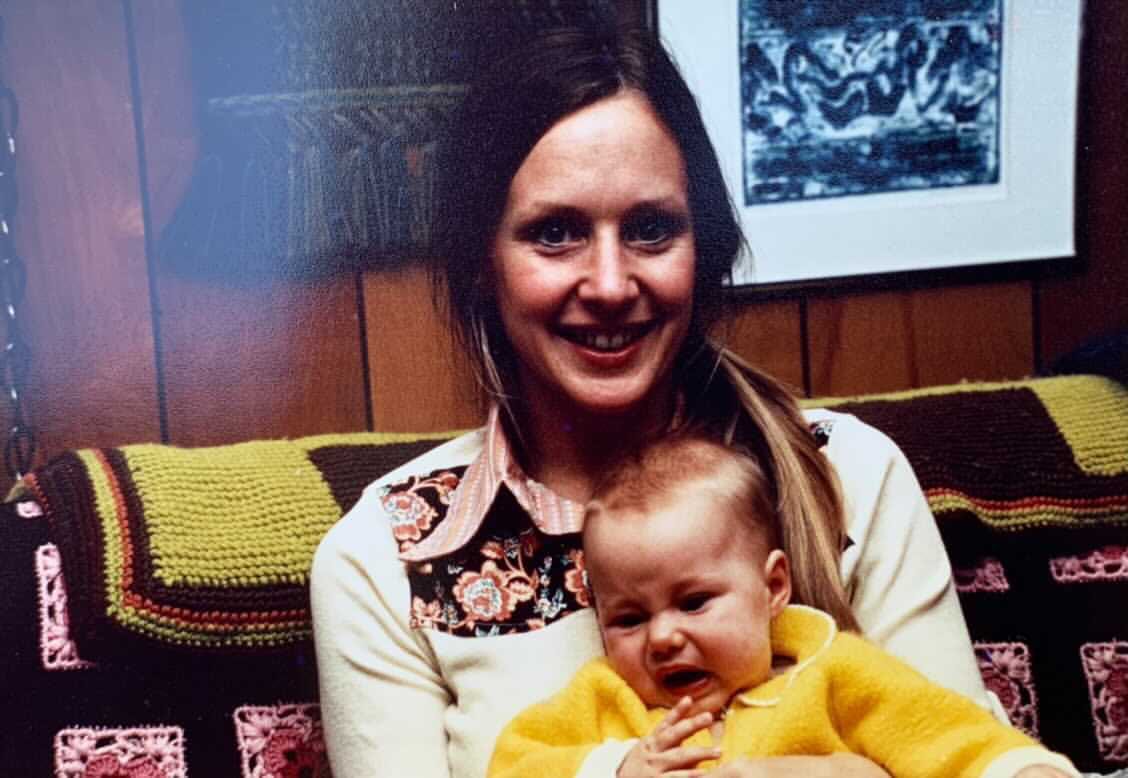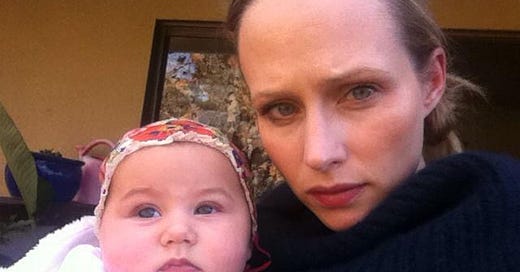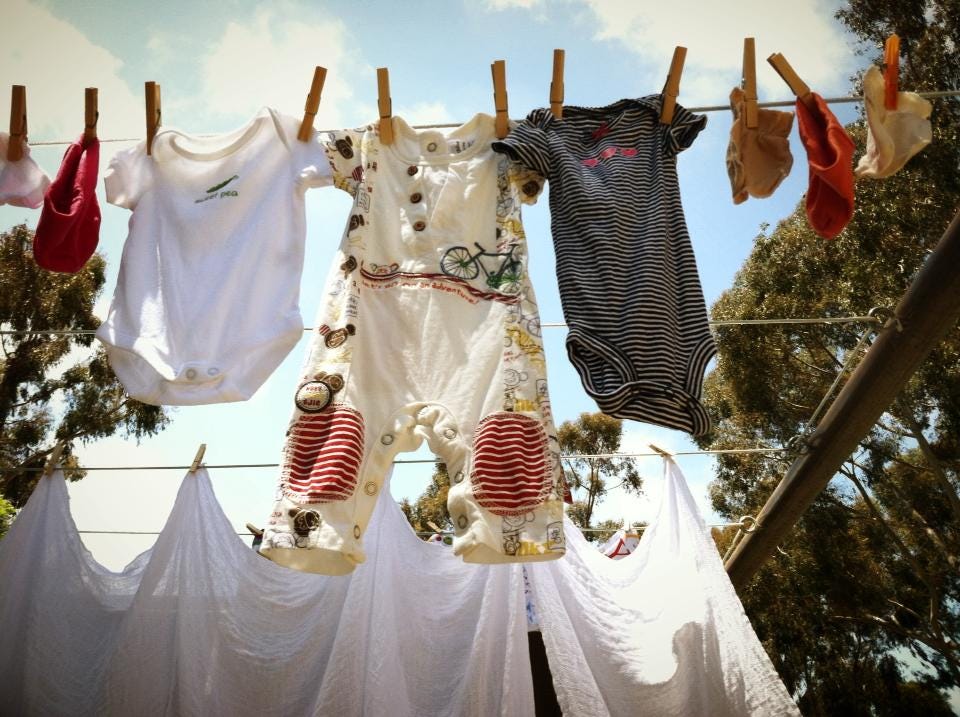My oldest is turning eleven and will start sixth grade in the fall—too young for middle school, imho, but no one asked me. In addition to shuddering as I recall my own angsty middle school years, the significance of her birthday is mostly that I’m grappling with my graduation from early motherhood. I’m out of conversations about sleep, baby-led weaning, or even learning to read. Are You There God? It’s Me, Margaret is on in the den.
With every anniversary, I find myself remembering the early days of my motherhood. They’re precious. I turn the memories over and over in my mind from the vantage of the present, giving new meaning to that formative period. Last year, I wrote an essay about duration and mothering.
This summer, I remember being pregnant in the second year of an incredible doctoral program in communication and science studies at UC San Diego. I earned about $1,900 a month. My wonderful partner had moved around the world with me and had a job that required intermittent travel. We lived on a shoestring. And what a glorious, golden shoestring it was! In Southern California, where the turquoise sea meets blue sky at every corner. We walked and bicycled and did yoga and went barefoot on the beach. We shared meals with interesting new friends. We lived in Mesa, UCSD’s graduate housing, which was—then, at least—spacious, and somewhat affordable. We were wealthy in community and conversation, nestled among fragrant eucalyptus trees. I might be overlooking some legitimate grievances I had at the time, and didn’t begin this essay to write this love song, but I loved that season of life. What a rosy memory.
Early in my pregnancy, I’d put our name on the waitlist for the university childcare center, but we were told we’d likely get a spot when the baby was twelve months old. Several of my colleagues—men and women—had babies and children though and they were generous with their wisdom. They appeared brilliant—if tired, but wasn’t everyone tired?—and able to work and teach just fine with their babies tied to their backs. So, I figured everything would work out. I didn’t worry too much because I didn’t want to stress the fetus.
I took classes and wrote seminar papers about visual culture and data, the history of objectivity, and metaphors. I helped organize a conference and participated in a workshop with Donna Haraway. In July, 33 weeks pregnant, I co-taught a month-long course on journalism in a digital age and in the warm evenings, I hung hand-washed onesies on a community clothing line.
After her birth in August, perhaps predictably, but surprisingly to me at the time, my daily life turned upside down. The new baby consumed me, delighted us, and I fell under a spell. I loved her cheeks. Getting out the door took an hour. I dreaded the looming deadline to resume a life of academic productivity. My goals from just months prior were unseasonable, strange.
Nevertheless, swollen from the c-section, I toured daycares, some that cost as much as I earned. Tendered and sleep-deprived, I met strange caretakers and strange babies. I wept when I thought about leaving mine.
The math was devastating. I could pay to leave my new baby with strangers, pay them all the money I earned, to work. And I couldn’t fathom it. Why would I do that? If I earned more, the math would have been different. If I’d been single, the math would have been different. But this was my life as it was and I couldn’t make sense of working. It wasn’t that I stopped caring about my work or degree, career or colleagues, it was simply that my vision changed, another compass I hadn’t realized was inside me was guiding me forward. This was strange, but I was not uncertain.
I’ll take a leave of absence, I told my partner in a hushed voice, she was so small, nursing. I will be her caretaker. Then, I’ll get a babysitter for only my hours in class. No matter how we sliced it, we’d be living on my partner’s salary. If I exited my program for too long, we’d lose our health insurance and housing. The math was devastating.
There are a range of directions I could take this story now. I could discuss the need for affordable childcare.
I could discuss the motherhood penalty. Research shows mothers earn less, advance in their career more slowly, and face implicit discrimination.
I could also retell the story about those days through the lens of privilege, class, interdependencies, or hormones.
Or I could dig into the paradoxes of the concept of choice and the ways that some strands of feminism, or of activism in general, have failed to impress upon daily life.
But why did I think about this today? How does the present change my experience of the past?
Here’s my point. It’s sharp. A few days ago, I saw Anne Helen Peterson’s newsletter teaser on Instagram and responses to it. I gleaned there was a new article about influencer BallerinaFarm, the handle for Hannah Neeleman, former Juilliard ballerina, beauty queen, mother of eight, who posts about her daily life on a farm in Utah and has zillions of followers. I dug and found The Times articles, by Megan Agnew[1], and Hannah’s recent response, on her website[2]. The latter’s social media presence has garnered a zillion more comments and thought pieces about modern mothering and the #tradwife meme, which is performing a wholesome, bucolic, hegemonic femininity for media consumption.
Some of Agnew’s observations of Neeleman’s life appeared to be judgements and the consequence was flushed debate about mothering, how to do it, how to perform it, how to write about it, and it’s all a cultural flashpoint to grapple with the meaning, and failures, of feminisms in our own lives, our pasts and futures.
This is the point. Thanks to this blitz of media, I immediately and uncritically began revisiting my own memories of touring those daycares and I began to revalue my personal/career ambitions using the optics of the present. What does it all mean?
This is the point. This is what happens to people. We compare. And compare again. In the present, I felt bewildered about my past choices, as if I’d navigated the tremendous costs of paying for daycare to work in the wrong way. Bewildered not because I have regrets—I don’t—but because, for a moment, I felt worried that I’ll be judged. (For what? By whom? For craving my baby and caring about a career? By critics of BallerinaFarm? By critics of Agnew?)
The point hurts. When this happens, we fall into the either/or labeling and shaming trap that too often fuels cultural debates, stifles the nuances of our contradictory living, and shifts attention away from services and policies that shape daily life for humans, for parents, for mothers into spirals of judgement and moral panic.
In other words, the logics of social media keep the conversation in the binary realm of shame, and this is successful even to someone who studies this. Because in the circuit of information, your emotion feels ahistorical and singular, yours. This is what happens when relationships are sustained in a device you keep in the palms of your hand or slipped into your pocket.
In her book The Cultural Politics of Emotions, Sara Ahmed described feelings as inherently social[3]. They feel a part of us because they impress onto our bodies. You get the impression. But some feelings are sticky; they stay or come easily in certain situations. Stickiness, Ahmed writes, “is an effect of the histories of contact between bodies, objects, and signs” (90, emphasis in original); the result of cycles of impressions.
Feelings about mothering are sticky. There are several gaping holes and threadbare patches in our social fabric where sticky feelings collate. Resentment. Envy. Despair. And it’s these ugly feelings that want recognition. Beg to be heard.
I’m emotive—we all are—so I can’t help but adjust my feelings to what I perceive is happening in my immediate surroundings. I can get stuck. But I am not those emotions or judgments.
In the past eleven years, I split open and I feel whole in my unfinishedness, my soupy ambiguity. I didn’t quit my doctoral program, I did go slow to care for my baby. And my mom, in a generous gift of care, moved in with us a few months later to help. Then we moved. Along came a second baby. Also miscarriages. My partner changed jobs to travel less. I shifted in my intellectual and professional interests and definitions of success. I did not aggressively seek out an academic job that required moving or would not provide some degree of flexibility and stability. We keep choosing to live in the off-key harmony of contradictions and messy iterations of care and interdependencies.
Perhaps a telling angle of Agnew’s article was the comment from Leslie Root, a demographer at the University of Colorado, on the popularity of the #tradwife meme. “This isn’t isolated, it is part of a wider political anxiety that I am worried might ultimately end in attempts to circumscribe women’s lives.”
That’s a story that needs to be heard, not mine, not any singular story. The meme. Why the meme now? Then, suddenly, social feelings, the stickiness, and judgments; these are responses to a meme that recedes from view, and the messy contradictions of living are replaced by fits of scorn and blame.
Caretaking and contradicting are not exclusive. We all change our minds. Let us buck Euclidean geometry and curve. Split open and say yes, and—?

Thank you for reading The Gift.
Until next time,
Monika
The Gift
Did you enjoy my words?
Did someone forward you this newsletter?
References
[1] https://www.thetimes.com/magazines/the-sunday-times-magazine/article/meet-the-queen-of-the-trad-wives-and-her-eight-children-plfr50cgk
[2] https://ballerinafarm.com
[3] Ahmed, Sara. The Cultural Politics of Emotion. NED-New edition, 2. Edinburgh University Press, 2014. http://www.jstor.org/stable/10.3366/j.ctt1g09x4q.




